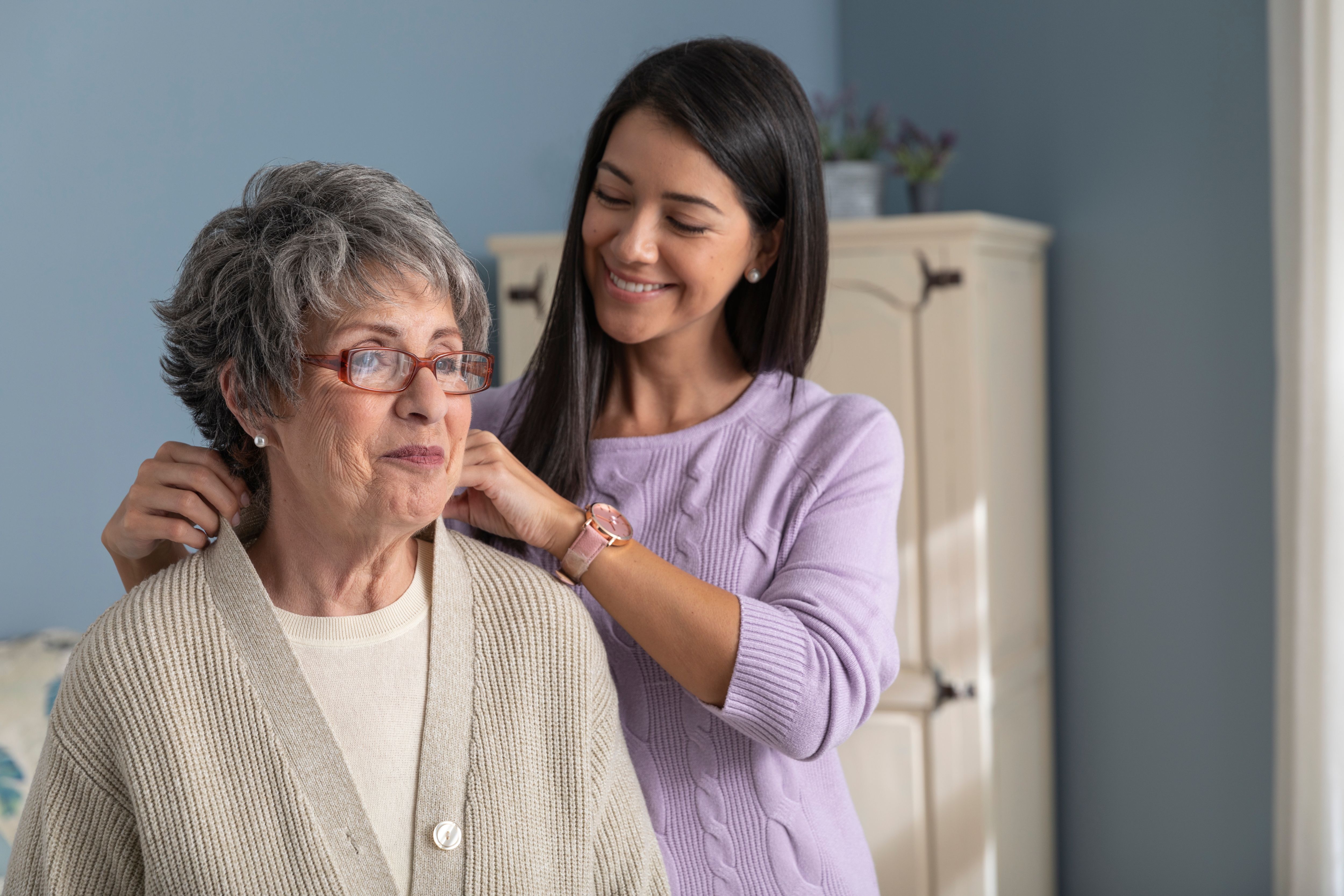For many patients, dementia is one of the most intimidating diagnoses. It is a gradual disease, changing day-by-day and month-by-month, impacting the health, personality, and independence of those diagnosed. Both patients and caregivers struggle with the implications and the unknown future connected to a dementia diagnosis.
Dementia Caregiver Tips
Written by Cassi Haggard, Staff Writer

What is Dementia?
Dementia and Alzheimer’s are not the same, though the terms are often used interchangeably. Dementia is a general term that describes the impaired ability to remember. It is an umbrella term that encompasses several diseases, including Alzheimer’s.
Alzheimer’s is a specific type of dementia resulting from damage to brain cells. It is one of the most common types of dementia1. Learn more about the difference between
Dementia Caregiver Tips
Initially, dementia is a hard diagnosis to accept. Forming a caregiving plan is essential to help everyone impacted feel more secure about the future. Caregiving for dementia will change as the disease progresses. Here are some tips that will be useful at any stage of the diagnosis
Maintain a Routine
Keeping a routine is essential. It establishes a pattern that will help your loved one feel more secure and keep you organized.
Keep Communications Simple
Dementia can lead to confusion so it’s best to keep any instructions and questions as simple as possible. There’s no need to overexplain or include extra details when fewer words will make it easier for your loved one to follow the conversation.
Stay Positive
Caregiving for someone with dementia is often frustrating. Instead of disagreeing with your loved one, keep your cool and reassure them. Dementia often causes fear, confusion, and insecurity. Staying positive can make things more comfortable for your loved one.
Use Distractions
When nothing else is working, it’s okay to distract your loved one. You can turn on a favorite TV show or change the topic of conversation. This will help both parties step away and come back to the conversation with a more relaxed perspective.
Early-Stage Dementia
At the beginning of a dementia diagnosis, most individuals can still live independently. This is a time to prepare for the future, get paperwork organized and make sure your loved one’s wishes are well documented.
Both you, as a caregiver, and your loved one can spend the early stages after diagnosis adjusting to your new roles.
Here are a few tasks to take care of during the early stages of the diagnosis:
- Look at estate planning and any legal documents.
- Perform a home safety check. This
checklist can help. - Start building a plan for future care.
- Organize any identity documents and other important paperwork into a centralized location.
In the early stages of dementia, it’s important to help your loved one remain independent. That might include making sure they keep appointments, reminding them of words or names, helping manage money and providing transportation when needed.2
You should assume your loved one is capable, allowing them to attempt doing things themselves before stepping in to help.
Late-Stage Dementia
As the disease progresses, the level of care increases. Patients eventually need full-time personal care. At this stage, patients may have difficulty eating and walking. You should focus on providing the highest quality of life possible. Even though your loved one may have limited ability to communicate, they’re still here and need connection to their friends and family.
Here are some tips for communicating with late-stage patients:3
- Speak calmly and slowly.
- Continue to talk and visit, even if they don’t respond.
- Use their name and offer a reassuring smile.
- Encourage self-feeding, only helping if needed.4
Overcoming Eating Challenges
It’s common for dementia patients to lose interest in food. Whether because they lose track of time or cannot recall when they’ve eaten, it’s important to continue eating a healthy and nutritious diet.
Here are some tips to help your loved one eat:
- Keep the timing of meals consistent.
- Start each day with a larger meal.
- Use colorful plates to help your loved one see the food.
For more tips, visit
Managing Personality and Behavior Changes
Handling personality and behavior changes is one of the most frustrating parts of dementia care. When the disease starts impacting your loved one’s personality and behaviors, many people experience anticipatory grief. 5 Navigating behavior problems while coming to terms with your own sense of loss can be a challenge, but knowing what to expect helps you plan ahead.
Common personality changes associated with dementia include:6
- Depression
- Wandering or getting lost
- Worrying or anxiety
- Imagining things
While you may not be able to stop the behavior, you can establish a routine and help your loved one feel safe. This alleviates some of the anxiety they may be experiencing. They might be confused and lashing out because of insecurity. There are several steps you can take to cope with behavior problems, including: allowing the person as much control as you can, speaking calmly, and reducing noise and clutter.7
Common Health Problems in Dementia Patients
Nobody expects you to be a doctor, but as a caregiver you might notice potential medical problems before anyone else. You’re on the frontlines of maintaining your loved one’s health and can observe any changes. Keeping an eye on potential problems will allow your loved one to get help when needed.
Here are some common problems that arise with dementia: 8
- Dental or mouth problems
- Flu or pneumonia
- Bowel issues
If you pay attention to potential problems, you’ll be able to schedule a doctor’s appointment before symptoms worsen. Learn more about common health problems at
Preventing Caregiver Burnout
Caring for a loved one is difficult, and burnout is a common problem among caregivers. It’s understandable that many caregivers forget about their own health, including preventative appointments, to prioritize their loved one. It’s essential to take care of your own well-being so you’re better able to provide care. Find out more about
Look into respite care, which is short-term care specifically for when you need extra time to rest, are traveling or have your own appointments. 9 Don’t feel guilty for using respite care, it’s a necessary tool to provide yourself the time you need, whether it’s to recharge or take care of your own responsibilities.
If you’re struggling to balance your job and your caregiving duties, research the Family and Medical Leave Act (FMLA). It offers job-protected leave for eldercare. 10
Caregiving is a huge responsibility and is often underrecognized. With time, experience and help, you will make an impact on your loved one’s life. You’ll be their companion, advocate, helper, and voice when they need you the most. Taking care of those you love is not easy, but it’s important work
Sources:
Dementia vs. Alzheimer’s Disease: What is the Difference? Early-Stage Caregiving Alzheimer’s Caregiving: Managing Personality and Behavior Changes Late-Stage Caregiving Anticipatory Grief & Alzheimer’s Disease Alzheimer’s Caregiving: Managing Personality and Behavior Changes Coping With Agitation, Aggression, and Sundowning in Alzheimer's Disease Common Medical Problems in Alzheimer’s Disease: Information for Caregivers What Is Respite Care? Using FMLA Leave to Care for Someone Who Was in the Role of a Parent to You When You were a Child



